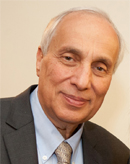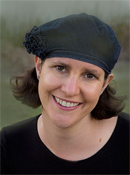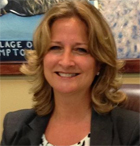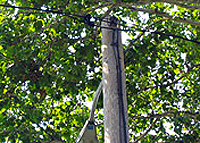Hampton residents who are opposed to eruv Orthodox Jewish boundaries in their towns are getting support from the new "Open Orthodoxy" of Judaism that rejects "boundaries, fences, high and thick." It accepts women as Rabbis and also same-sex marriage.
 Weiss Weiss |
Rabbi Avi Weiss of the Hebrew Institute of Riverdale, New York,who retired last month, denounced the focus of some Jews "on boundaries, fences, high and thick—obsessing and spending inordinate amounts of time ostracizing and condemning and declaring who is not in…"
There is no question that Rabbi Weiss is referring to eruvim, say Hampton residents who are trying to get officials of WHB to join Southampton and Quogue in fighting imposition of an eruv.
WHB counsel Brian Sokoloff told Justice Kathleen Tomlinson Feb. 26 that WHB, unlike SH, Quogue, Verizon and Long Island Power, has never opposed an eruv and is not opposing one now.
WHB has chosen not to seek enforcement of a sign law for both private and public property that would bar an eruv, said Prof. Marci Hamilton in an 18-page paper in 2008 prepared for WHB.
The stance of WHB officials, who were hammered at their Aug. 6 meeting, is that they can’t discuss anything that is "in litigation." Residents at the meeting accused the trustees of "hiding behind lawyers."
Activist Rabbi Weiss Quit RCA
Rabbi Weiss, described by Yeshiva World News as "the man who re-invented his brand of Judaism as a social movement, and while doing so has trampled upon both the sanctity and boundaries of Halacha," (Jewish law), resigned from the Rabbinical Council of America in June.
Open Orthodoxy, as defined by Rabbi Weiss, accepts the divinity of Torah and observance of Halacha but is "not rigid. It is open to a wider spectrum."
This includes accepting women as rabba, the feminine of rabbi. "There are no Halachic barrier that would prevent women from becoming spiritual leaders within Synagogue whatever the title," he said.
 Hurwitz Hurwitz |
Rabba Sara Hurwitz was ordained by Rabbi Weiss in 2010, becoming the first woman to hold that title. She is also Dean of Yeshiva Maharat, Riverdale.
Allows Gay Members
Rabbi Weiss, in announcing his retirement, published a 1,149-word statement in tabletmag.com June 30 outlining his positions.
"The dividing line with Orthodoxy today," he wrote, "revolves around inclusivity. Is Orthodoxy inclusive of women—encouraging women to become more involved in Jewish ritual and Jewish spiritual leadership?
"Notwithstanding the Torah prohibition on homosexuality, are those in such relationships included as full members in our synagogues, and are their children welcomed into day schools?
"Do we respect, embrace, and give a forum to those who struggle with deep religious, theological, and ethical questions? Do we insist upon forbiddingly stringent measures for conversion, or do we, within Halakhic parameters, reach out to converts with love and understanding?
"Should Orthodox rabbinic authority be centralized, or should it include the wide range of local rabbis who are not only learned but also more aware of how the law should apply to their particular situations and conditions?"
Instead of spending "inordinate amounts of time" on boundaries and fences, Synagogues should "focus on creating welcoming spaces to enhance the character of what Orthodoxy could look like in the 21st century," he says.
Rabbi Weiss has frequently criticized the Rabbinical Council of America, opposing its centralized control of Orthodox conversions in the U.S., said the Jewish Telegraphic Agency June 29, 2015.
The 13-mile eruv in Manchester, U.K., completed in 2014 after ten years at a cost of about $500,000, costs about $50,000 a year to maintain.
The Manhattan eruv was erected after Mayor Ed Koch cleared the way by putting pressure on the Parks Department and other entities that were involved. Cost of construction and maintenance is probably $100,000+ because of its complexity.
"The Parks Department was opposed to every step of this because it involved canisters and wires being installed on lampposts at the edges and sometimes within the parks," Rabbi Saul Berman said in a videotaped discussion of eruvim.
"But the Mayor’s office came down on them very hard and insisted that they cooperate with us in the process of installation that began in late 1992 and it took them until 1994," Rabbi Berman added.
Weiss Led March in NYC
Rabbi Weiss led a vigil and march in Manhattan June 30, 2014, in remembrance of three Israeli boys who were kidnapped and murdered in the West Bank earlier in June.
The Jewish Telegraphic Agency, also reported that Rabbi Weiss had resigned from the Rabbinical Council of America because it would not admit as members rabbis whose sole ordination was from the rabbinical school he founded, Yeshivat Chovevei Torah, Riverdale.
He set up the seminary in 2000 as an alternative to Yeshiva University’s Rabbi Isaac Elchanan Theological Seminary. Chovevei Torah is based at Weiss’ synagogue and is now led by Rabbi Asher Lopatin.
Also resigning from RCA, in sympathy with the stand of Rabbi Weiss, was Rabbi Shmuel Herzfeld of Ohev Shalom Synagogue in Washington, D.C., the oldest Synagogue in D.C. A former assistant to Rabbi Weiss at the Hebrew Institute of Riverdale, he has headed Ohev Shalom since 2004
Southampton to Appeal June 30 Ruling
SH Town Attorney Tiffany Scarlato said SH will appeal the June 30 ruling of State Supreme Court Justice Joseph Farneti who found that since proposed lechi markers on utility poles would not be visible, they are therefore not "signs" and the sign law of SH is not applicable. SH has six months to file the appeal.
Arnold Sheiffer, chairman of Jewish People for the Betterment of WHB, said the decision was "outrageous" because it fails to note that eruvim are highly visible on website maps posted by Synagogues or Google or both.
He said lechis "create a ghetto-like Orthodox community."
Lechis are "religious symbols which are prohibited on public property," he wrote in a letter to the July 30 Southampton Press.


 Mayor Maria Moore of Westhampton Beach has quit the library board after six years. Critics said she should have quit in June 2014 when she was elected mayor. Moore served eight years on fund-raising for the $7.5 million library.
Mayor Maria Moore of Westhampton Beach has quit the library board after six years. Critics said she should have quit in June 2014 when she was elected mayor. Moore served eight years on fund-raising for the $7.5 million library. Mayor Marie Moore of Westhampton Beach, responding to nearly 25 minutes of complaints by residents of failure to communicate about an eruv Orthodox Jewish boundary in WHB, has proposed a “community meeting” on the subject. We have suggestions for that.
Mayor Marie Moore of Westhampton Beach, responding to nearly 25 minutes of complaints by residents of failure to communicate about an eruv Orthodox Jewish boundary in WHB, has proposed a “community meeting” on the subject. We have suggestions for that. Westhampton Beach trustees, who have kept the
Westhampton Beach trustees, who have kept the  Westhampton Beach, as well as most of the media covering it, by ducking the threat of multi-millions in costs related to the proposed eruv Jewish religious boundary, are failing to acknowledge the power of the web.
Westhampton Beach, as well as most of the media covering it, by ducking the threat of multi-millions in costs related to the proposed eruv Jewish religious boundary, are failing to acknowledge the power of the web.


 Have a comment? Send it to
Have a comment? Send it to 
No comments have been submitted for this story yet.